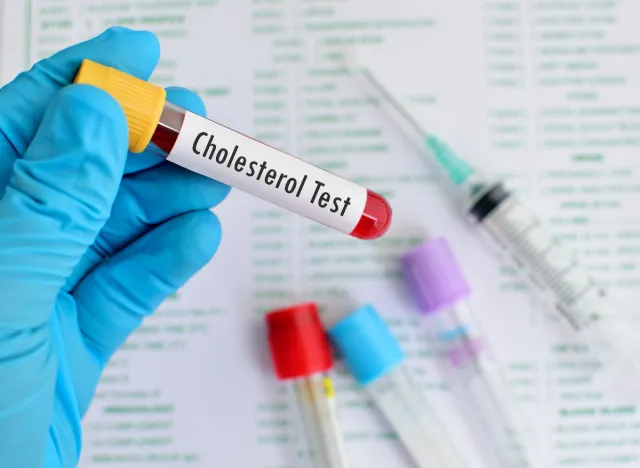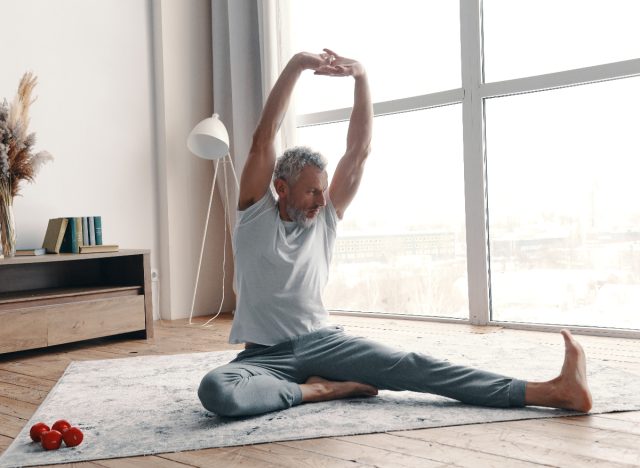Ah, cholesterol. Although this "waxy, fat-like" element in your bloodstream is one of those words that makes people cringe, some of it is actually necessary in order for your body to produce healthy cells. But too much of anything is never good, and elevated cholesterol levels can put you at greater risk of developing cardiovascular disease. If your cholesterol levels are high, listen up. We spoke with Dr. Mike Bohl, MD, MPH, CPH, MWC, ELS, a member of the Eat This, Not That! Medical Expert Board about the surprising exercise habits that'll help lower your cholesterol.
Having high cholesterol could lead to a stroke or heart attack

Why is having high levels of this substance so dangerous? According to Mayo Clinic, excess cholesterol can create fatty deposits in your arteries, impeding the natural flow of blood. If the fat deposits break and clot, you can suffer from a stroke or heart attack.
Although high cholesterol can be genetic, many people develop it as a result of poor lifestyle choices. An unhealthy diet is a big factor, in addition to being overweight. Some medical conditions can cause extra cholesterol, including lupus, hypothyroidism, HIV/AIDS, chronic kidney disease, and diabetes (via Mayo Clinic). Surprisingly, certain medications taken for high blood pressure, cancer, irregular heart rhythms, and even acne can adversely impact your cholesterol levels.
Stay in check with your levels, and get a blood test

What to do about it? We reached out to Dr. Bohl for some expert-backed tips and tricks. First off, there are no warning signs to indicate high cholesterol. He explains, "The only way to know if you have high cholesterol is to get a blood test."
Clearly, it's important to stay in check with your levels. Typically for adults 20 years of age and up, cholesterol screenings should be done every four to six years, according to the American Heart Association (AHA). This information—along with other factors such as high blood pressure, diabetes, whether or not you smoke, genetics, and your age—can give your medical professional any indication of your 10-year or lifetime chance of having a stroke or heart attack.
Step up your game with aerobic exercise, like fast-paced walking, jogging, or biking

We asked Dr. Bohl to share some healthy fitness habits that can help bring down cholesterol levels. Dr. Bohl explains, "Often, the type of exercise recommended for lowering cholesterol and reducing the risk of heart disease is aerobic exercise." He adds, "This can include fast walking, jogging, running, biking, and swimming."
With the nice weather upon us, it's so easy to incorporate some of these fun activities into your weekly routine. Whether you recruit your exercise buddy or do it solo, stepping up your aerobic exercise game is necessary. Plus, it will help break up the day!
Resistance training and yoga are key players, too

You may be surprised to learn about two other kinds of exercise you can do to positively impact your cholesterol levels. "The first is resistance training, or weightlifting. This could be with free weights, bands, or machines. And the second is yoga. Studies show that doing yoga can reduce LDL, which is commonly known as 'bad' cholesterol," Bohl tells us. He adds that exercise is incredible in increasing your HDL levels, which he explains "is commonly known as 'good' cholesterol."
Here's how much exercise you should get each week

Just how much exercise is needed to keep your levels in check? The American Heart Association and the Centers for Disease Control and Prevention (CDC) recommend the proper amount adults should strive to perform each week. According to Bohl, "The general recommendations are 150 minutes of moderate-intensity physical activity or 75 minutes of vigorous-intensity physical activity (or a combination of both) per week, plus two or more days of muscle-strengthening exercise per week."
There are other lifestyle tweaks you can make as well. You can maintain a healthy diet and weight, quit smoking, keep your stress level down, and limit your alcohol consumption (via Mayo Clinic).